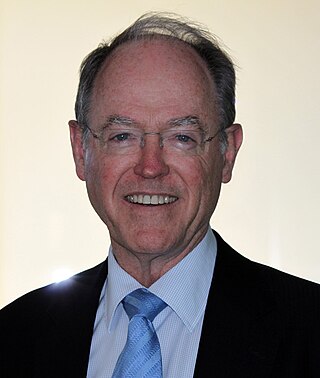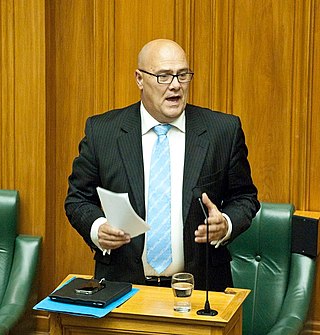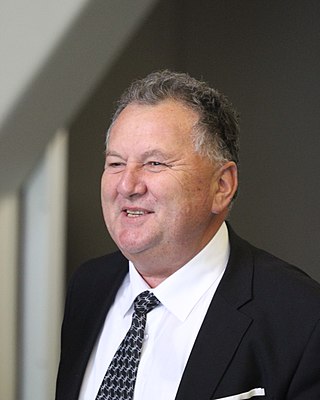The New Zealand National Party, shortened to National or the Nats, is a centre-right New Zealand political party that is the current senior ruling party. It is one of two major parties that dominate contemporary New Zealand politics, alongside its traditional rival, the Labour Party.

Dame Jennifer Mary Shipley is a New Zealand former politician who served as the 36th prime minister of New Zealand from 1997 to 1999. She was the first female prime minister of New Zealand, and the first woman to lead the National Party.

ACT New Zealand, also known as the ACT Party or simply ACT, is a right-wing, classical liberal, right-libertarian, and conservative political party in New Zealand. It is currently led by David Seymour, and is in coalition with the National and New Zealand First parties, as part of the Sixth National government.
New Zealand First, commonly abbreviated to NZ First or NZF, is a political party in New Zealand, founded and led by Winston Peters, who has served three times as deputy prime minister. The party has formed coalition governments with both major political parties in New Zealand: with the New Zealand National Party from 1996 to 1998 and 2023 to present, and with the New Zealand Labour Party from 2005 to 2008 and 2017 to 2020. New Zealand First currently serves in a coalition government with both National and ACT New Zealand as part of the Sixth National government, having won 6.08% of the total party vote in the 2023 New Zealand general election.

Donald Thomas Brash is a former New Zealand politician who was Leader of the Opposition and leader of the New Zealand National Party from October 2003 to November 2006, and leader of the ACT New Zealand party for seven months from April to November 2011.

Sir Simon William English is a New Zealand former politician who served as the 39th prime minister of New Zealand from 2016 to 2017 and leader of the National Party from 2001 to 2003 and 2016 to 2018. He had previously served as the 17th deputy prime minister of New Zealand and minister of finance from 2008 to 2016 under John Key and the Fifth National Government.

Nicolas Rex Smith is a New Zealand politician who served as a Member of Parliament (MP) for the National Party from 1990 to 2021. He served as a Cabinet minister, holding various posts including Minister for Building and Housing, Minister for the Environment, Minister for Climate Change Issues, and Minister of Local Government. For a brief time between October and November 2003 he was the deputy leader of the National Party, then in opposition under Don Brash.

Gerard Anthony Brownlee is a New Zealand politician and the 32nd speaker of the New Zealand House of Representatives. He was first elected as a member of the New Zealand House of Representatives for Ilam in 1996, representing the National Party. He became a list MP in 2020.

Sir Trevor Colin Mallard is a New Zealand politician and diplomat. Since 2023, he has served as Ambassador of New Zealand to Ireland. He was a Member of Parliament from 1984 to 1990 and again from 1993 to 2022. He served as Speaker of the New Zealand House of Representatives from 2017 until 2022.

Pansy Yu Fong Wong is a New Zealand former politician.

David William Parker is a New Zealand lawyer, businessman and politician who has been a Labour Party Member of Parliament since 2002.

Sir John Phillip Key is a New Zealand retired politician who served as the 38th prime minister of New Zealand from 2008 to 2016 and as leader of the National Party from 2006 to 2016.

Raymond Tau Henare is a former New Zealand Māori parliamentarian. In representing three different political parties in parliament—New Zealand First, Mauri Pacific and the National Party—Henare served as a Member of Parliament (MP) from 1993 to 1999 and from 2005 to 2014.

Shane Geoffrey Jones is a New Zealand politician and a member of the New Zealand House of Representatives for the New Zealand First party.

Paula Lee Bennett is a New Zealand former politician who served as the 18th deputy prime minister of New Zealand between December 2016 and October 2017. She served as the deputy leader of the National Party from 2016 to 2020 and as MP for Upper Harbour from 2014 to 2020.

John Bernard Hayes is a former New Zealand politician and diplomat. A member of the National Party, he was a Member of the New Zealand House of Representatives in the Wairarapa electorate from 2005 to 2014.

East Coast Bays is a New Zealand parliamentary electorate. It was first formed in 1972 and has existed apart from a break lasting two parliamentary terms. The electorate has been held by Erica Stanford of the National Party since the 2017 general election.

Paul Jonathan Goldsmith is a New Zealand historian and politician. The biographer of several leading right-wing political and business figures, he was first elected a list member of the New Zealand House of Representatives for the National Party at the 2011 election.
The 2016 New Zealand National Party leadership election was held on 12 December 2016 to determine the next Leader of the National Party and the 39th Prime Minister of New Zealand. A secret exhaustive ballot of the 59-member National parliamentary caucus was to be used in the event of a contested leadership.
The Shadow Cabinet of Bill English formed the official Opposition in the 46th and 47th New Zealand Parliaments while Bill English led the New Zealand National Party, which was the largest party not a member of the Government. English was elected National Party leader unopposed in October 2001. He led the Party to its worst-ever result at the 2002 general election and was replaced as leader by first-term MP Don Brash in October 2003.



















